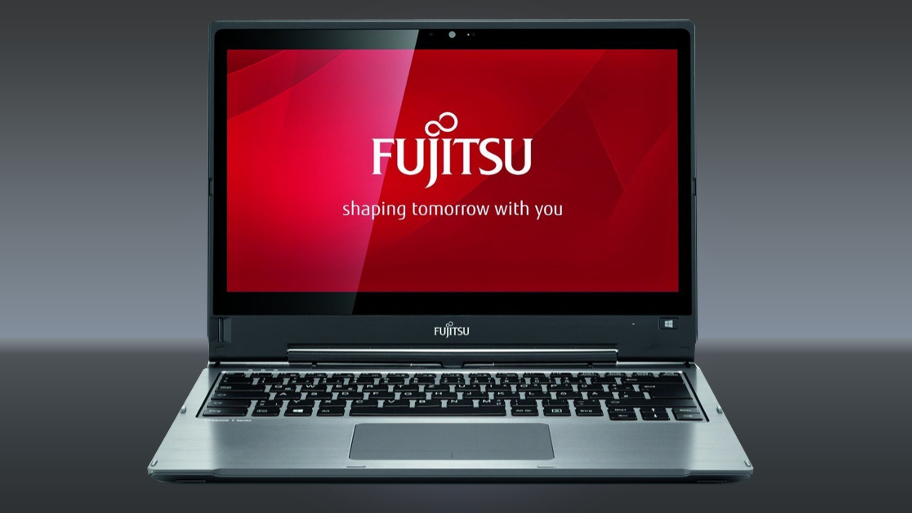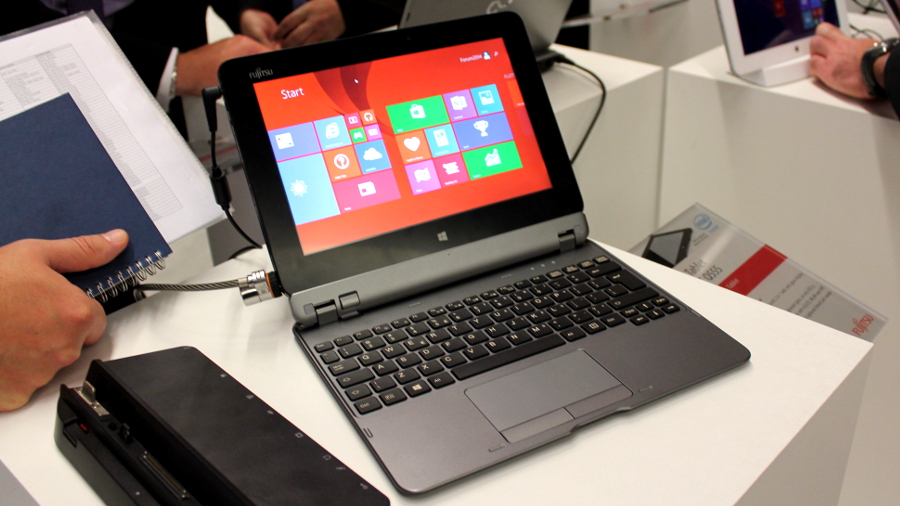Fujitsu: Human Centric Innovation is the next big mega-trend in computing
Company has added two-factor authentication to PalmSecure Palm Vein tech

Human Centric Innovation is a multi-faceted theme that runs throughout IT giant Fujitsu's products and services. By Fujitsu's definition, it's an open and collaborative approach to innovation led by individuals, rather than organisations, and focuses on how technology can have a positive impact on both business goals and society.
According to Michael Keegan, head of UK and Ireland at Fujitsu, Human Centric Innovation can help address issues such as work-life balance and caring for the elderly. Keegan believes that it will be a key trend in computing in the coming years.
TechRadar Pro spoke to Keegan at the Fujitsu Forum expo to find out more about the human-inspired discipline, the company's stance on Windows 8.1 devices in business, and why its decision to bolster its PalmSecure biometric technology with two-factor authentication was based on a cultural requirement.
TechRadar Pro: What is Human Centric Innovation?
Michael Keegan: We think that Human Centric Innovation is the big mega trend in computing. It's about making sure that individuals can live more fulfilled lives enabled by technology. Whether that's more in terms of their personalising the workspace that they are in or addressing their work-life balance because they're mobile-enabled, we think it's important that technology serves society and serves the humans in the society as the focal point.
It's not just about driving ruthless efficiency to make businesses more profitable. It's much bigger than that. Technology offers the chance for a more cohesive society where we can change a number of things that we've taken for granted over a number of years in terms of work patterns and the ability to mix work environments with home environments. It can be down to something like needing flexibility to look after children.
If you think of the big macro-economic trends in our society such as people living longer, we're all going to be dealing with a lot more elderly ageing parents for longer, I think computing offers a human-centric society with the ability for us to respond more intelligently to these trends and use technology to help offer solutions to problems like loneliness, ageing populations and work-life balance.
Are you a pro? Subscribe to our newsletter
Sign up to the TechRadar Pro newsletter to get all the top news, opinion, features and guidance your business needs to succeed!
TRP: Windows 8 hasn't been a hit with consumers or business users. Are 2-in-1s the best way for tablet makers like Fujitsu to get the operating system into businesses?
MK: Microsoft is a hugely important partner for us and mobile is a hugely important space. We see that there's a big future for Microsoft there, but we recognise that there are others with huge technologies too - we've all got Android phones and we offer such solutions.
In our line of business productivity apps we still see a big future for Microsoft. Productivity is important and business apps are important, as is having those managed and automatically getting the latest releases.

TRP: Why has Fujitsu introduced two-factor authentication to its PalmSecure Palm Vein technology?
MK: Our PalmSecure technology comes from Japan's parentage. It was originally introduced to provide secure ATM access for people in Asia. In Asia, there's more hesitancy about physical contact between people and each other, and physical hardware or devices. Therefore, putting in your pin-code and touching something is more invasive to an Asian person than a Palm Vein scan.
Some of what we're looking at in terms of delivering two-factor authentication on top of the Palm-Vein Biometric technology is adding a second level of authentication that can improve security as part of a bigger and better sequence. We're looking particularly in the security and defence industries where you have to be really careful about protecting data.
TR: How is Fujitsu driving business growth?
MK: Fujitsu as a whole has had a reasonably good first half of the year in terms of global results. We've grown in terms of our revenue and profits in terms of market expectation. We've also rearranged our company to be a much more globally integrated player - we split our business into five big global regions. In many ways for the first time since I've worked at the company, which is eight years, Fujitsu is much more globally aligned and capable of delivering consistent solutions to big companies and customers around the world. That's a very big change from the sort of company we have been in the past.
TRP: What has been the outcome of that restructuring process?
MK: The restructuring process has made us match fit for serving the large enterprise customer base, particularly in the private sector. If there's one sector I'm particularly interesting in growing, it's that. We see a lot of opportunity for growth there, and we think the American players have had it their way for far too long. For the UK and Ireland in our first half year we closed showing eight per cent year-on-year revenue growth and four per cent profit growth.
TRP: What are some of the biggest challenges when it comes to serving the private sector in the UK?
MK: Traditionally in the private sector we have not been as strong as some of the other players. That is largely for historic reasons, with the number one factor in the past that has gated our growth being our ability to consistently deploy solutions for large organisations that are present in more than one market.
With the restructuring we largely eliminated that as a concern for big customers. And, therefore, for international businesses that are headquartered in the UK but might have a lot of deployment in other markets, we're a much more attractive player.
If you look at our private sector base we have a lot of retailers with accounts with Fujitsu, and we've been taking a lot of business in the private sector - we've had wins with Argos, Morrison's and Homebase and the home retail group - in addition to Marks & Spencer's and others. So we're very happy with our growing presence in retail, in addition to wins in the transport sector.
